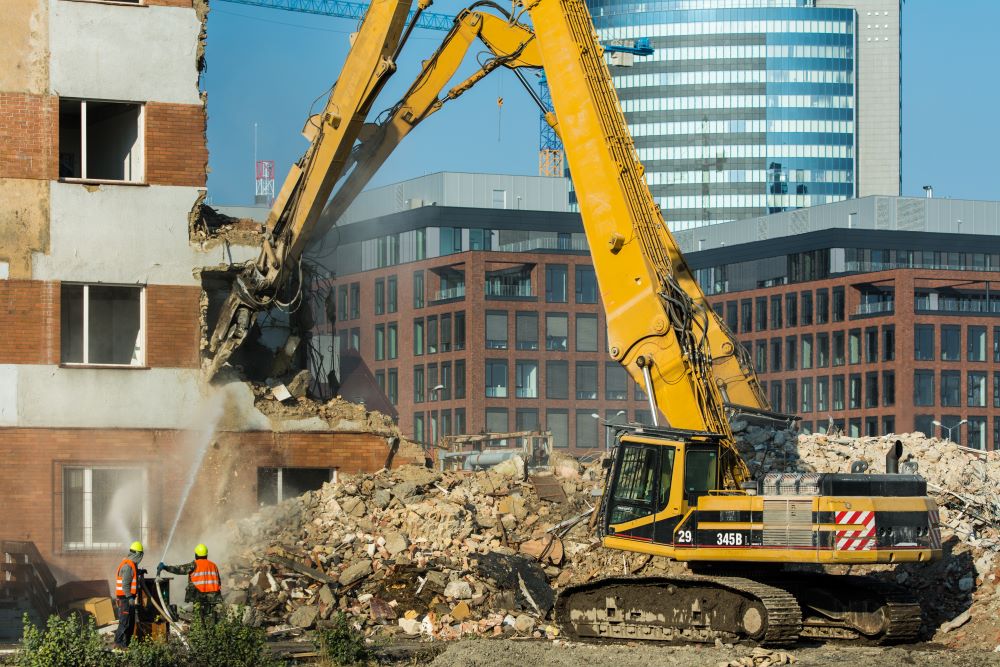
Securing Infrastructure’s Future with Industrial Demolition Service
Do you want to safeguard your infrastructure’s future? Our industrial demolition service is the only thing you need to consider. We can safely and effectively demolish old, antiquated buildings to make room for new construction thanks to our experience and state-of-the-art methods. In order to guarantee the durability and security of infrastructure, industrial demolition is essential. Large-scale industrial facilities, such as factories, warehouses, and power plants, must be dismantled and disposed of.
We reduce the negative effects on the environment and guarantee a smooth and easy demolition process by using the newest technology and following stringent safety procedures. As part of our dedication to sustainability, we place a high priority on recycling and appropriate material disposal, which helps to lessen our environmental impact. You can rely on our skilled staff to manage your demolition requirements and consistently provide outstanding outcomes. To find out how we can help secure the future of your infrastructure, get in touch with us right now.
OUR SERVICES
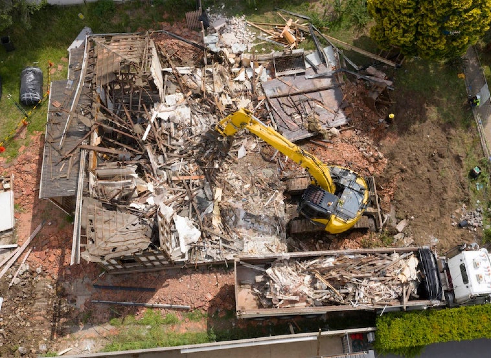
Structure Demolition. Residential, Commercial & Industrial
If your structure poses a health, safety, or environmental risk, demolition can prevent costly citations or fatal accidents. While this may seem daunting, you are just a phone call away from having your residential demolition done professionally, responsibly, and at a great price.
Talk to a Demolition Specialist Now! 916.249.5001
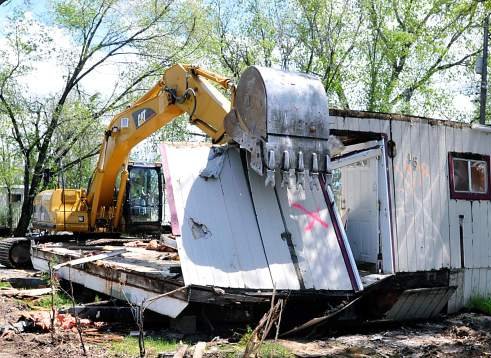
Mobile Home Demolition
We demolish and haul away mobile homes. Any size, anywhere, anyhow. We are fast, clean and competitive. We serve most of Northern California. There are many factors to consider when removing or demolishing your old trailer, mobile home, or manufactured home like: the processes involved, costs, time, contractors, debris, and permits.
Talk to a Demolition Specialist Now! 916.249.5001
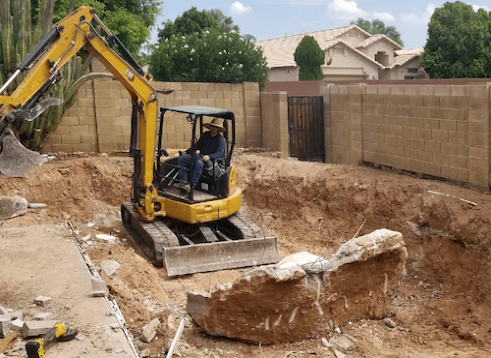
Pool Demolition
When removing a pool in Sacramento, California with the professional demolition team of Maxton Demo, you’re guaranteed peace of mind from beginning to end. From your initial request for an estimate to clean-up, you can expect our pool demolition process that’s completely professional and safe.
Talk to a Demolition Specialist Now! 916.249.5001
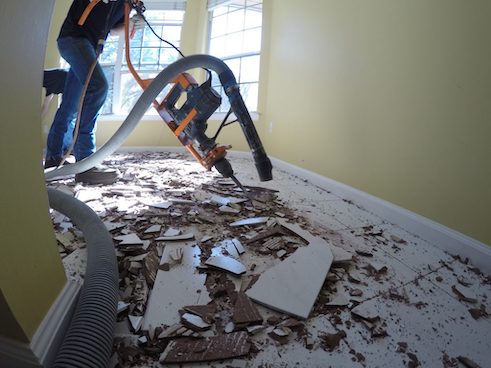
Floor Demolition
Flooring demolition, like any other major home renovation work, requires a specific set of skills and tools to be performed properly. You need experts in flooring demolition to get you the best floors possible. Contact us to find out more about how we can help you today.
Talk to a Demolition Specialist Now! 916.249.5001
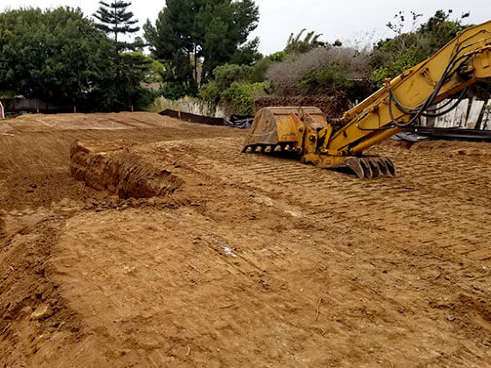
Grading & Excavating
If you need an experienced excavator and grader in Sacramento, call us today. One of the many reasons that residential, commercial, and industrial customers choose to work with us is because we’re able to provide a broad range of services to help construction-related projects get done in less time and at a reduced cost.
Talk to a Demolition Specialist Now! 916.249.5001

Roof Snow Removal
Heavy snow & ice dams can cause significant roof and home damage. Roof Snow removal is our specialty during the winter months. Serving the Sacramento, California area for 10 years, we can get your roof snow removed and promise a quick response and reasonable rates.
Talk to a Demolition Specialist Now! 916.249.5001
Recognizing the Function of Industrial Demolition in Preserving the Future of Infrastructure
It is crucial to comprehend how industrial demolition directly advances the objective of safeguarding infrastructure for the future. The process entails much more than just demolishing aging facilities; it calls for a methodical strategy to safely, effectively, and ecologically responsibly dismantle structures. By concentrating on a building’s whole lifetime, from construction to ultimate destruction, stakeholders can make sure that every stage is carried out with consideration and care.
Risk management is one of industrial demolition’s main responsibilities. Unsuitable buildings may provide a variety of problems, including environmental dangers and structural instability. Businesses may successfully reduce these hazards by using expert demolition services. Professional demolition crews carry out in-depth analyses to find any risks, guaranteeing that the right precautions are taken to protect the environment, the public, and employees. In addition to securing the local region, this proactive strategy creates the framework for future growth.
Industrial demolition is essential to innovation in addition to risk management. Opportunities for fresh designs and technology to replace outdated buildings present themselves when they are demolished. Only when obsolete facilities are demolished can modern construction techniques like smart technology integration and green building practices be used. In addition to improving infrastructure, this change supports international sustainability objectives, making industrial demolition a crucial component of the movement toward a more environmentally friendly future.
Project Types for Infrastructure That Need Industrial Demolition
Industrial demolition services are required for a variety of infrastructure projects, each with its own set of needs and difficulties. Demolition of abandoned warehouses and industries is one such type. The demolition of these buildings permits the reuse of land for new constructions, such as residential complexes or commercial centers, since they often become eyesores and safety risks within communities. These kinds of areas may be transformed to revitalize communities and boost local economies.
Power plant decommissioning is another important industry that needs demolition services. Many conventional power plants are becoming outdated as the globe moves toward renewable energy sources. Because these plants may contain dangerous elements that need to be handled and disposed of carefully, it is imperative that they be disassembled safely. Expert demolition crews are prepared to handle these intricacies, guaranteeing that decommissioning procedures comply with safety and environmental requirements.
Industrial destruction is also often needed for infrastructure projects like road extensions and urban redevelopment. Outdated roads and buildings may obstruct development as cities expand and change. In order to make room for new infrastructure, which may improve connectivity and traffic flow in metropolitan areas, demolition services are essential. These kinds of improvements improve inhabitants’ general quality of life in addition to facilitating improved mobility.
Safety Considerations in the Industrial Demolition Process
To fully appreciate the intricacies of industrial demolition and the safety concerns involved, one must have a thorough understanding of the process. A detailed evaluation of the building to be destroyed usually starts the process. In this examination, the building’s structural integrity is examined, hazardous chemicals are identified, and possible threats to the environment and neighboring buildings are assessed. Developing a comprehensive demolition strategy that puts safety first requires these kinds of inspections.
Getting the required permissions and approvals is the next step once the planning stage is finished. With many municipal, state, and federal rules to follow, the regulatory environment around demolition may be complicated. Expert demolition crews can speed up the permission procedure, guaranteeing compliance and reducing delays since they are knowledgeable about these regulations. In order to prevent legal issues that might result from non-compliance, this step is essential.
When it comes to the actual demolition process, safety protocols are crucial. Depending on the building and its location, this step often calls for the employment of either explosives, heavy equipment, or hand deconstruction methods. To reduce dangers to employees and the general public, professionals use a variety of safety precautions, including protective clothing, secure site fencing, and thorough evacuation plans. Throughout the demolition process, team members’ constant communication and observation assist in guaranteeing that safety procedures are observed.
Things to Take Into Account While Selecting an Industrial Demolition Service Provider
Choosing the best industrial demolition service provider is an important choice that may have a big influence on how a project turns out. The company’s experience and level of knowledge in the sector are among the most important considerations. A supplier that has successfully completed projects of a similar kind in the past will possess the expertise and abilities needed to properly handle any obstacles that may arise. Examining previous project portfolios and customer reviews may provide important information about a business’s capabilities.
The company’s dedication to safety and compliance is another crucial factor. Customers should ask the demolition crew about their safety procedures and training courses. A trustworthy supplier will put safety first and show that its employees take responsibility for their actions. To ensure adherence to regional laws, it is also crucial to confirm that the business has the required licenses and certificates.
Lastly, in today’s environmentally sensitive environment, assessing the company’s sustainability strategy is becoming more and more crucial. Customers have to look for suppliers that place a high value on recycling and ecologically friendly disposal techniques. In addition to lessening the environmental effect of demolition operations, a dedication to sustainability supports CSR objectives. Clients may accomplish their demolition goals and help create a more sustainable future by selecting a service provider that shares these principles.
Environmental Aspects of Industrial Dismantling
One crucial element of industrial destruction that cannot be disregarded is environmental concerns. Significant trash is often produced by the process, and if improperly managed, this garbage may negatively impact the ecology. Therefore, for every demolition job, creating a thorough waste management strategy is crucial. Strategies for controlling hazardous waste, recycling products, and reducing landfill contributions should all be included in this strategy.
Making the most of recycling possibilities is one of the main objectives of environmental management in demolition. Many materials may be recycled for new building projects or other uses, including wood, metal, and concrete. Demolition crews may minimize the project’s environmental impact by putting recycling first and drastically lowering the quantity of garbage dumped in landfills. Because recycled materials sometimes have reduced disposal costs, this may save customers money in addition to helping the environment.
Furthermore, dangerous elements like lead or asbestos must be carefully considered while demolishing a building. To ensure that hazardous items are removed and disposed of in compliance with environmental rules, professional teams are trained to properly identify and handle them. Demolition services can protect the environment and reduce any health hazards to employees and the neighborhood by proactively addressing these issues.
Industrial Demolition’s Future and How It Will Affect the Development of Infrastructure
The function of industrial demolition in infrastructure development is expected to change even more in the future. Technological developments like automation and robots are making the demolition process safer and more effective. These developments minimize waste and the effect on the environment by enabling more accurate demolition of buildings. Additionally, the use of smart technology may improve project management by guaranteeing more accurate adherence to budgets and schedules.
The increasing focus on eco-friendly and sustainable methods is another noteworthy development. Stakeholders are increasingly looking for demolition services that stress recycling and appropriate trash management as environmental problems gain more public awareness. This change will continue to spur industry innovation and push businesses to use more environmentally friendly procedures and technology. A dedication to sustainability that is in line with international objectives for a more conscientious approach to development will probably determine the future of industrial destruction.
Furthermore, new prospects for industrial demolition services will arise as a result of the changing urban planning and development environment. The need for updating aging infrastructure will rise as cities expand and adjust to shifting economic and demographic trends. In order to address the various demands of urban contexts while maintaining safety and compliance, suppliers will need to take a flexible and responsive approach to demolition.
In conclusion, industrial demolition has a promising future full of chances for development and innovation. The sector will become more and more important in determining the infrastructure of the future as it embraces sustainability and adjusts to new challenges. Stakeholders may safeguard the future of their infrastructure and help create a more sustainable world by giving priority to efficient demolition techniques.
Utilizing Strategic Industrial Demolition Service to Create New Opportunities
In addition to guaranteeing the safe disposal of old buildings, strategic industrial demolition lays the groundwork for future growth. Businesses must adjust to shifting consumer expectations and technical breakthroughs in a quickly changing economic environment. Old infrastructures might become liabilities that impede development. Businesses may remove these obstacles and move on with innovation and expansion by strategically demolishing existing structures.
Furthermore, community growth and urban redevelopment depend heavily on the planned destruction of industrial buildings. In order to boost economic development, many communities must fix their aged infrastructure. Cities may rejuvenate areas and draw in new companies and people by tearing down deteriorating structures, which will eventually improve the quality of life for existing residents. This procedure helps the local economy as a whole in addition to benefiting specific businesses.
Strategic industrial demolition may have positive effects on the environment in addition to promoting development. Hazardous elements that endanger human health and the environment may be present in many older buildings. Expert demolition services are prepared to manage these items in a responsible and safe manner, guaranteeing adherence to environmental standards. Businesses may support their corporate social responsibility efforts by reducing these risks and creating a safer, cleaner environment.
Strategic Industrial Demolition’s Advantages
Beyond just clearing space, smart industrial destruction has several advantages. The potential for large cost reductions is one of the main benefits. Businesses may save on labor costs and the price of hiring large machines and equipment by contracting with specialist organizations to handle demolition work. Professional demolition companies may also reduce disposal costs and enhance material recovery since they often have established agreements with recycling and garbage disposal facilities.
The improvement of project timeframes is another important advantage. Businesses have less downtime as a consequence of skilled demolition contractors’ ability to finish projects quickly and effectively. This is especially important in highly competitive sectors where a company’s bottom line may be greatly impacted by time to market. A well-planned and timely demolition may speed up the building of new facilities, which will eventually increase returns on investment.
Last but not least, companies might realign themselves in the market via strategic industrial destruction. Companies might investigate new development prospects, such as diversifying their product lines, boosting capacity, or moving to more advantageous locations, by demolishing obsolete structures. Businesses may get a competitive advantage from this repositioning, which will enable them to better meet consumer expectations and market developments.
Organizing and Setting Up a Strategic Industrial Demolition Initiative
For any demolition job to be successful, careful preparation is essential. In order to detect any possible risks, such as asbestos or lead-based materials, and to examine the building’s structural integrity, a comprehensive site assessment is the first stage in the planning process. The proper demolition techniques and safety precautions required to guarantee a successful operation will be determined in part by this evaluation.
Establishing a precise budget and schedule for the demolition project is therefore essential. In close collaboration with the demolition contractor, project managers should specify important deadlines and provide resources appropriately. This entails taking into account elements like labor needs, equipment availability, and any delays brought on by inclement weather or other unanticipated events. A well-defined timeframe will assist in minimizing interruptions to existing company activities and keep the project on pace.
Lastly, the planning process requires cooperation and communication among stakeholders. This involves informing nearby companies, staff, and local authorities of the impending destruction. Clear communication may allay worries and guarantee that everyone is ready for the changes that lie ahead. For a safe demolition, it’s also essential to work with utility providers to disconnect utilities like gas, electricity, and water.
Strategic Industrial Demolition Tools and Equipment
Tools and equipment are critical to the success of a strategic industrial demolition operation. A range of specialized equipment is used by demolition contractors to safely and effectively disassemble buildings. For bigger projects, wrecking balls, bulldozers, and excavators are often used because they provide the force required to safely demolish enormous structures. These devices can be precisely controlled and are built to support large loads, which lowers the possibility of unintentional harm to nearby buildings.
To improve the effectiveness and safety of the demolition operation, contractors often use cutting-edge technologies in addition to large gear. Drones, for instance, may be used to inspect the site from the air, improving planning and evaluating the state of the construction. In a similar vein, workers may be less at risk while using remote-controlled equipment under dangerous circumstances. Contractors may guarantee project completion and operational efficiency by using technology.
Lastly, for more complex demolition jobs, equipment like metal cutters, hydraulic shears, and concrete saws are necessary. With the use of this equipment, contractors may more precisely disassemble buildings, enabling selective destruction and the preservation of priceless artifacts. Demolition contractors may streamline the process and guarantee that projects are finished on schedule and under budget by using the appropriate equipment combination.
Strategic Industrial Demolition Cost Considerations
Businesses thinking about this choice must comprehend the financial ramifications of strategic industrial deconstruction. The size and complexity of the building, the presence of hazardous chemicals, and the necessary permissions and laws are some of the variables that may greatly affect the overall cost of a demolition job. The site’s location may also affect prices, especially when taking disposal and transportation costs into account.
Labor is a major factor in the cost of demolition. Although it may cost more to hire a qualified and experienced demolition contractor, doing so may save a lot of money over time by guaranteeing the job is finished safely and effectively. Less expensive contractors could take shortcuts, which might lead to higher expenses in the end because of delays, safety infractions, or poor waste management.
Fees for recycling and garbage disposal are additional expenses to take into account. In order to reduce disposal costs, several demolition firms have built agreements with nearby recycling facilities. To guarantee openness about possible expenses, it is crucial to have an early conversation with contractors about waste management techniques. Businesses should also think about the possibility of recouping value from salvaged items, which may help defray the total cost of demolition.
Accepting Industrial Demolition as a Step Toward Sustainable Infrastructure
To sum up, industrial demolition is a vital service that is critical to safeguarding our infrastructure’s future. Professional demolition services are crucial as we deal with the problems of old buildings, environmental issues, and changing community demands. Stakeholders may guarantee the safe and effective demolition of outdated structures by funding these services, opening the door for new construction that satisfies contemporary needs.
Furthermore, using expert industrial demolition services has advantages beyond compliance and safety. The focus on sustainability and appropriate trash disposal is in line with international initiatives to build a more environmentally friendly future. Demolition crews may create a healthier atmosphere and provide outstanding outcomes for customers by emphasizing recycling and environmentally friendly procedures.
Adopting industrial demolition is ultimately about imagining a future where infrastructure is long-lasting, outfitted with cutting-edge technology, and planned with sustainability in mind, rather than merely demolishing outdated buildings. Although industrial demolition’s function will continue to change in the future, its significance in forming our built environment will never change. Stakeholders may successfully negotiate the challenges of infrastructure development and ensure a sustainable future for future generations by collaborating with knowledgeable experts.
Do you have a Question?
Talk to a Demolition Specialist Now! 916.249.5001
Request Formal Quote